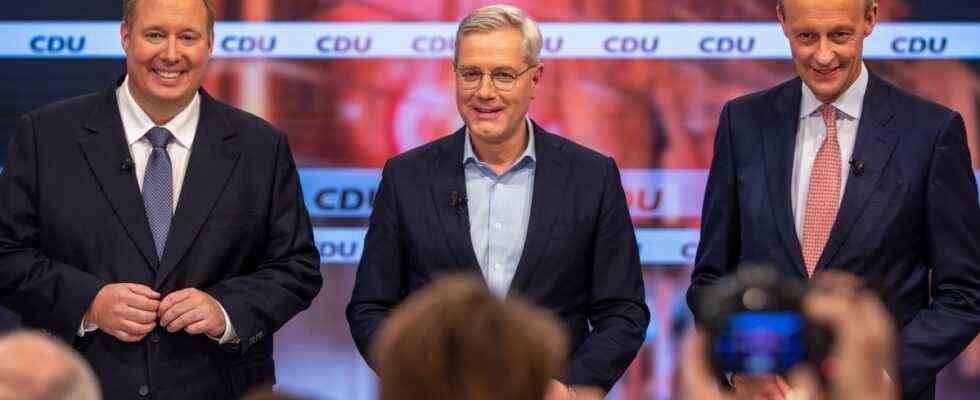The three desks look like they’re made of cardboard. One would have expected the intrusive investment advisor in the foyer of a district savings bank to be more likely than the men who apply for the chairmanship of the CDU. If the idea was to express the grassroots character of this event, then it worked.
They now call it “Townhall”, which should sound more forward-looking than it looks – for the first time, party members are also allowed to help in the search for the new CDU leader. Basically, Friedrich Merz, Norbert Röttgen and Helge Braun are not doing anything on this Wednesday evening in the Konrad-Adenauer-Haus in Berlin that one could not have thought of beforehand: They answer – nicely alternating – questions from party members.
The knowledge value of such an event can only lie in the fact that the differences between the applicants become recognizable. But you can quickly see that this format is hardly suitable for this. On the one hand, the Adenauer House selected the questioners. An above-average number of women, young party members and Christian Democrats with a migration background then have their say. On this evening, the CDU presents itself as it wants to be one day, but is far from being. On the other hand, all candidates have apparently resolved not to interrupt one another or openly criticize one another. Sometimes you almost wonder why they don’t compete in a team.
In order to be able to identify any differences at all, the details are also important: Röttgen got the lectern in the middle by lot, a place that he should like. He sees himself as the most legitimate representative of the center of the People’s Party. The fact that he also wants to be the lawyer for young people may explain why he was the only one to come without a tie and why he casually steps up to the lectern when answering the questions. After all, he refrains from pulling a miner’s badge out of his jacket in memory of the outgoing chairman Armin Laschet.
There is finally dissent on the issue of women’s quota
However, when there is a question, Röttgen and his opponents become pathetic. A woman who has just joined the CDU wants to know from the candidates what the C and U in the party name mean to them.
Röttgen says that the C is an absolutely unique selling point. He did not join the CDU because he read the party program, but because his parents “lived the C”. There are “thank God” in other parties too, Christians. But there is only the CDU, which derives its policy from the Christian image of the human being. And the U is the expression that the CDU is “a party of commonality” that brings social camps together. “That’s why the C and the U are the biggest things we have.”
Merz is also fundamentally. “When you’re involved in secular politics, the C is the compulsion to be humble, knowing that we as humans only ever give the penultimate answers,” he says. And the U stands for Union – what one therefore has to do today is “overcoming the religious borders in all of Germany and in Europe” and an invitation to all those “who do not belong to any religion”.
Because the moderator forgets Helge Braun, he can only give his C-and-U perspective after an intervention. “Our Christian foundation of values actually always gives a compass,” says Braun – but he says nothing about which direction this compass points.
In return, everyone then says something about the women’s quota, and there is finally a clear disagreement. Braun and Röttgen are in favor of the quota, Merz can not be so enthusiastic about it. The subject is controversial even within his team. His wish-general secretary Mario Czaja is for the quota, says Merz. His wish-vice-general secretary Christina Stumpp against it. And he himself wants to talk about the subject again. So his team “covers the whole spectrum,” he jokes.
Personal photos as final statements
Or maybe that’s just an attempt not to mess with any member. Because at the weekend the member survey about the CDU chairmanship begins. Merz is considered a favorite, but you can never be sure about such surveys.
In their final statements, the candidates should then each present a photo of their own choosing. Merz has brought a picture with him that shows him in large in the middle and his two team members Czaja and Stumpp a little smaller on the edge. Merz promises that he wants to be a hard-working worker in the party. Röttgen, on the other hand, makes a fiery plea for family happiness, in his photo he is hugging his wife and daughter. “It shows that there is also a life outside of politics,” says Röttgen. Helge Braun opted for a particularly exotic motif – cheering CDU members. It comes from the 2013 election victory. He wanted a CDU that could win again and that would tackle a good 40 percent from then, says Braun. He has decided to do something in view of the current surveys.
But perhaps this difference is not entirely insignificant: Braun is the only one who has chosen a photo in which he is not the center of attention.

